Stood in his neat and modern kitchen, Dere Amo cooks a pan full of pasta to last him several days.
Next to the hob a Ramadan decoration hangs down from a cupboard door, across from a microwave and an old Panasonic 40-inch TV that sit atop a jet-black worktop.
The room looks out onto a sparsely-decorated living area with bare white walls against which are two black two-seater sofas and a dinner table on which two wooden chairs are stacked.
Dere, 23, who is fleeing from armed militia and religious fanatics in Iraq, lives with three other men from Kuwait, Afghanistan and Sudan in a four-bed Victorian end-terrace in Burnley.
Once the capital of the cotton weaving world during the Industrial Revolution, the former mill town – along with its neighbours of Accrington and Blackburn – has become a golden triangle for asylum seekers.
This once thriving 11-mile stretch of Lancashire now houses more migrants per capita in private accommodation than in any other part of the country where asylum hotels are absent.
Faced with growing public outrage over putting the illegal newcomers into hotels, the Government has pledged to close them all by 2029 and instead start putting people into Houses of Multiple Occupancy across Britain.
Dere came to Burnley from Nasiriyah, in Southern Iraq, two years ago after paying people-smugglers 1,200 Euros to cross the Channel from France.
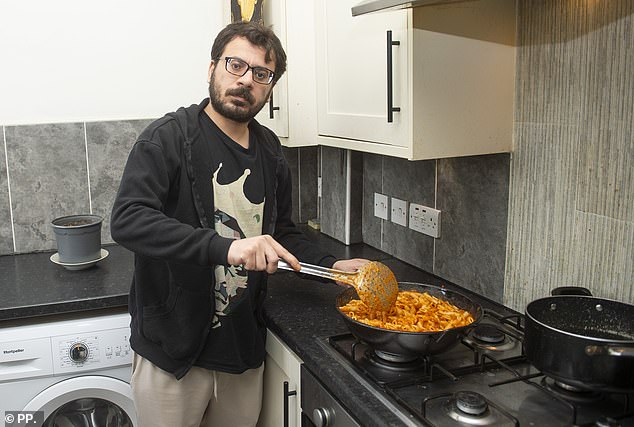
Stood in his neat and modern kitchen, Dere Amo (above) cooks a pan full of pasta to last him several days
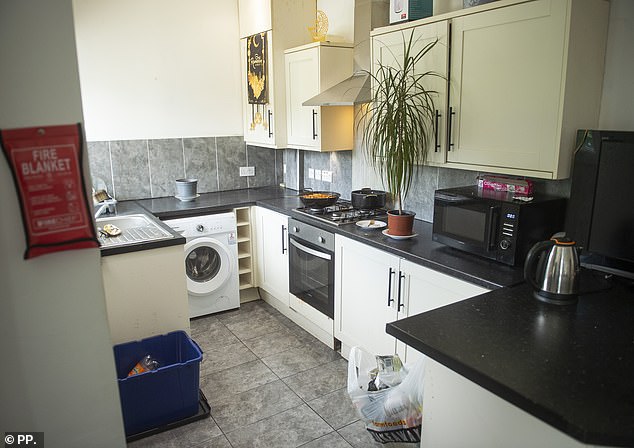
Next to the hob a Ramadan decoration hangs down from a cupboard door, across from a microwave and an old Panasonic 40-inch TV that sit atop a jet-black worktop
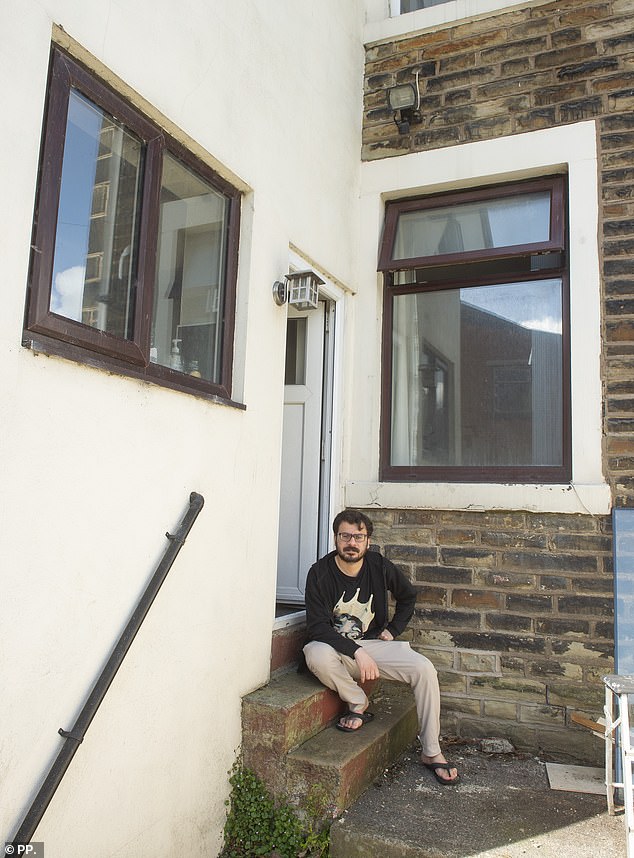
Dere (above) lives with three other men in a four-bed Victorian end-terrace in Burnley
After being processed in Dover he was put up briefly in a hotel near Heathrow being transferred up to the Casa Mere Hotel in Knutsford, Cheshire, where he stayed for four months before arriving at his £131,000 home.
He said: ‘I came here because life in Iraq was too dangerous. There are too many armed militias and hardline extremists. I am a Muslim but not like them.
‘I liked the hotel in Heathrow, it was clean and modern but I was only there for a few days. I found the hotel in Knutsford to be dirty and filled too much with sick people. I was pleased to leave there and come here.
‘I’m still waiting from my asylum application to be accepted but I’ve been here for two years and so because of that I’ve been given permission to work.
‘The difficulty is that I don’t have an e-Visa and so no potential employer will give me a job. It’s very frustrating but I’m learning English at Burnley College so that if I do get accepted, I can have more options-work wise.
‘I want to head to London, it’s a very big city, there’s more jobs and a bigger Arab community. I can work in an Arabic restaurant or shisha bar.’
In the streets outside Dere’s house, St George and Union flags flutter from lampposts as part of the political movement Operation Raise the Colours, seen by some as a display of patriotism but others as a way in intimidating asylum seekers.
Pinned to the wall by the kitchen window is a notice from Serco, who have the Home Office contract to house asylum seekers in the North West, warning in various languages about protesters targeting migrant accommodation.
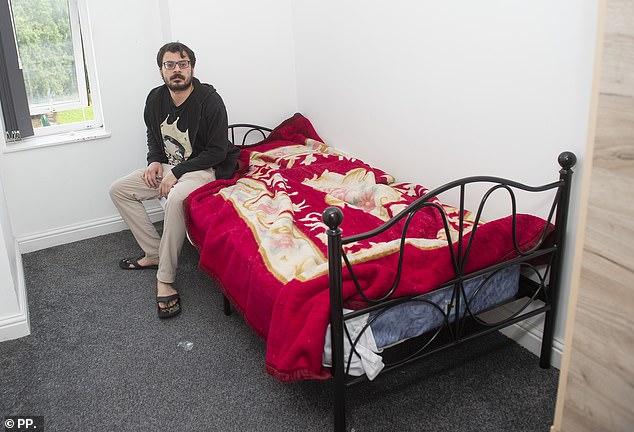
Dere’s bedroom contains little furniture other than a bed which is decorated with red covers
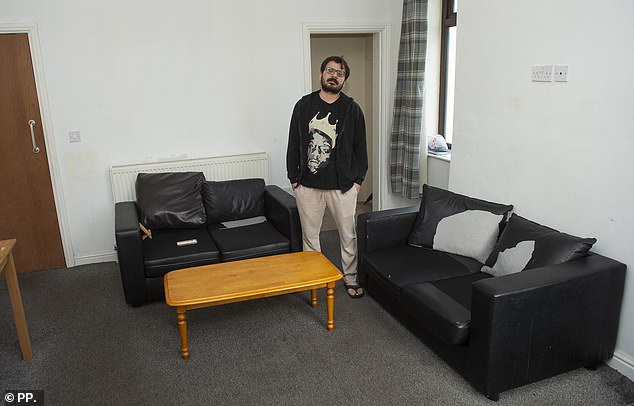
Dere’s sparsely-decorated living area has two black two-seater sofas against bare white walls
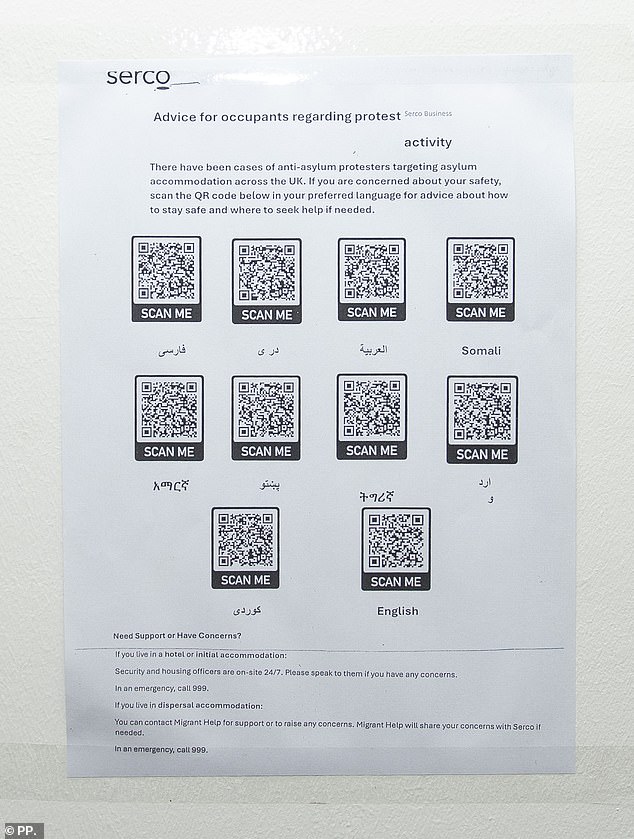
Pinned to the wall by the kitchen window is a notice from Serco, warning in various languages about protesters targeting migrant accommodation
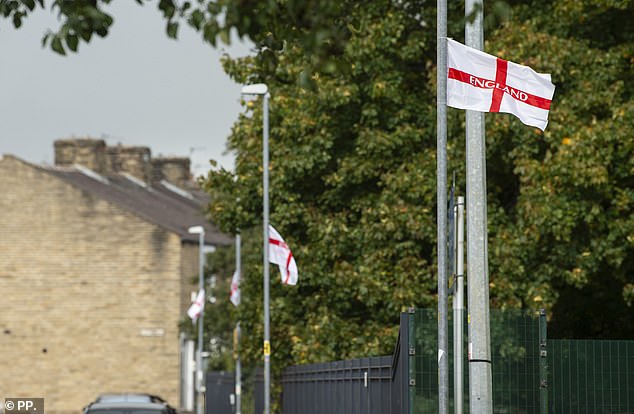
In the streets outside Dere’s house, St George and Union flags flutter from lampposts as part of the political movement Operation Raise the Colours
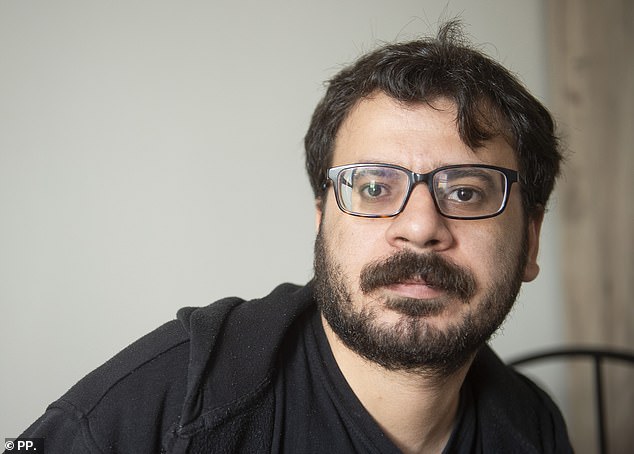
Dere (above) was put up briefly in a hotel near Heathrow being transferred up to the Casa Mere Hotel in Cheshire, where he stayed for four months before arriving at his £131,000 home
Dere said he is careful when he goes out after being assaulted by three men in the town centre a few months ago.
He added: ‘Every city has its good and bad people and Burnley is the same.’
Burnley is home to 474 asylum seekers in private homes, which equates to 49 per 10,000 people. It’s the second highest ratio in England in areas of the country that have no migrant hotels.
Only neighbouring Hyndburn Council – which includes Accrington – is higher with 435 asylum seekers in HMOs which amounts to 51 per 10,000 people. Blackburn is not far behind, housing 764 asylum seekers or 46 per 10,000 people.
Two miles west from Dere’s home is the more genteel suburb of Padiham, where Abiel from Eritrea lives with two housemates, men from Sudan and Afghanistan.
The five-bedroom house – extended from three – is along a quiet suburban street where the average house price is around £100,000.
Inside, there is an open plan kitchen and sitting room. The kitchen has a single oven and hob and is separated from the living area by an arched wall.
Abiel refrains from giving his full name. He fled his home in Senafe in Eritrea last year fearing for his life and travelled through Europe to France, where he made the trip across the Channel in an inflatable dinghy.
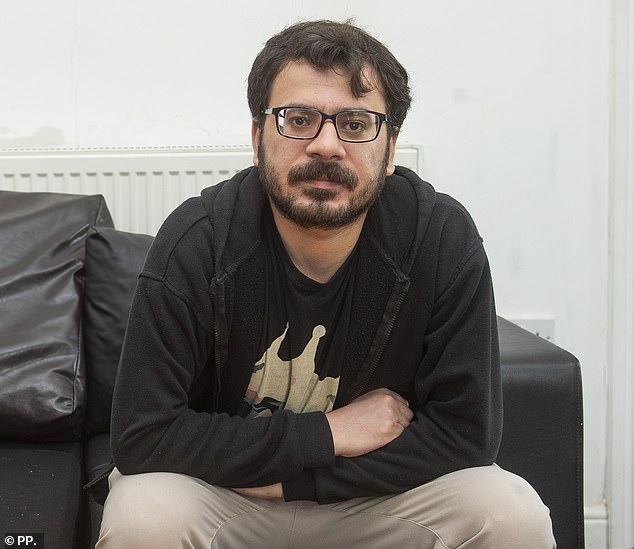
Dere (above) said he is careful when he goes out after being assaulted by three men in the town centre a few months ago
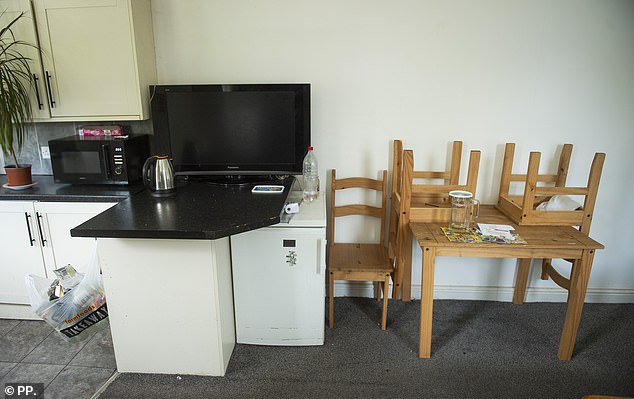
Inside Dere’s house is a small dining table and a television perched on his kitchen worktop
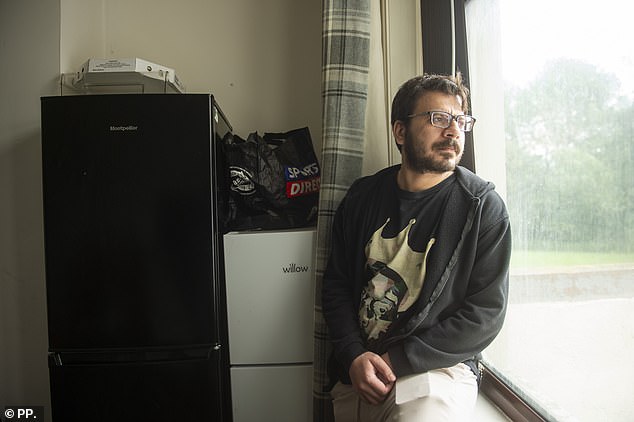
Dere hopes to leave Burnley to eventually work in the ‘bigger Arabic community’ of London
He said: ‘I wanted to leave Eritrea because the Government there is not good, I felt as though my life was in danger.
‘I travelled from Africa to Europe and up to France and crossed over into England in a small boat. It was very dangerous as it was winter time last year and conditions were not good.’
With a population of 97,425 Burnley has around 42,000 homes, of which 118 are being used for asylum seekers.
The town was 82.5 per cent white, 14.7 per cent Asian, 0.3 per cent black and 1.6 per cent mixed-race in the last census in 2021 and the recent influx of migrants is causing rising tension.
In a corner terrace, on the edge of the ringroad skirting Burnley’s town centre, a young Sudanese man answered the door and in broken English he confirmed he was seeking asylum and said he had come to Britain five-months ago but declined to answer any more questions.
Fixing his car nearby, Michael Deakin, 22, said: ‘The police have been on alert in Burnley, there’s been some hostility and resentment at the fact that so many people have come here and we don’t know anything about them.
‘I’ve seen it happen myself. Three lads came into a pub in town a few months back and they looked Middle Eastern.
‘They’d come for a karaoke evening but the locals reacted badly. A few got really angry and were shouting ‘get out of this pub it’s a British pub and you don’t belong here.’
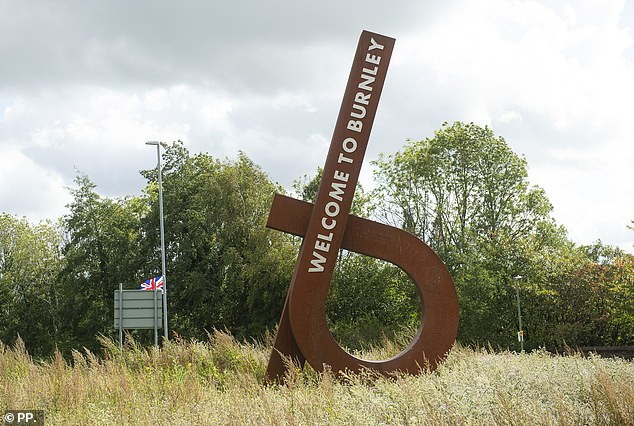
With a population of 97,425 Burnley has around 42,000 homes, of which 118 are being used for asylum seekers
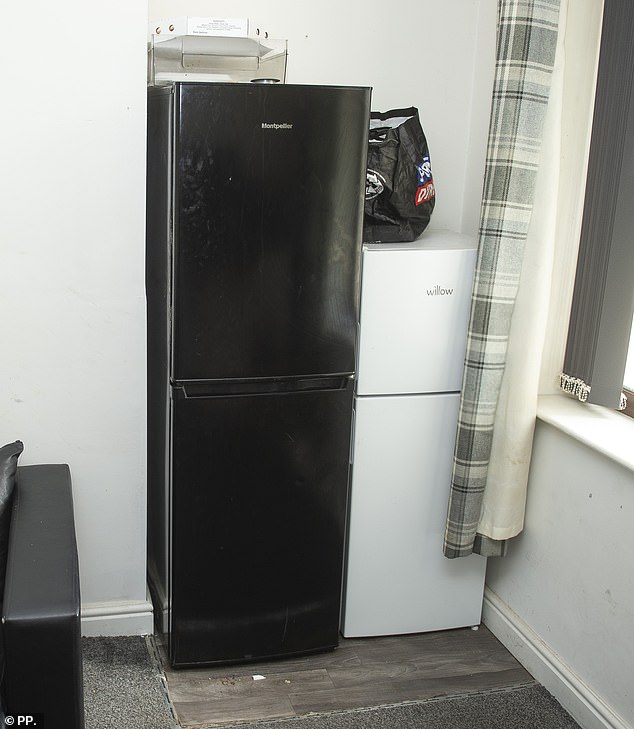
Interiors of Dere’s HMO in Burnley show two large fridges next to his living room sofa
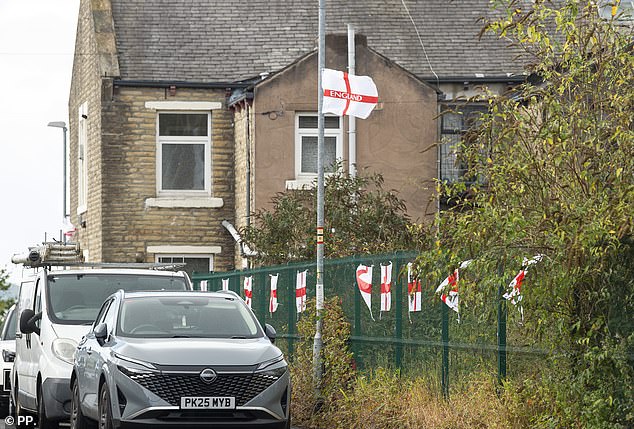
The display of St George’s flags have been seen by some as a display of patriotism but others as a way in intimidating asylum seekers
‘These lads left shortly afterwards as they clearly felt uncomfortable. I felt sorry for them.’
In Gannow in Burnley – an area festooned with England and British flags – police are investigating a suspected arson attack on a Victorian Methodist church which had been the home – until 2021- of Wright’s Upholstery.
A fire broke out on August 19 at the rear of the property where a load of timber had been left outside. The blame has been pointed at angry locals who fear the building is being converted into an HMO for asylum seekers.
In a statement Lancashire Police said: An investigation is underway, and we are working with the fire service to determine the cause of the fire, and if there are any suspicious circumstances.’
A council notice pinned to a wire fence in front of the building reveals the authority’s intention to turn the historic building into 48 studio flats for students not asylum seekers.
But local mechanic Nicholas Porter, 51, said: ‘I don’t think many people believe the council.
‘Myself I’m not too bothered with asylum seekers but a lot of people are. There’s been that fire and workmen clearing the place have had to call police a few times as well apparently because they’ve been targeted by locals. It does kick off quite a bit round here.’
Employment in Burnley in the year ending December 2023 was 76 per cent, an increase on the previous year and higher than the North West average.
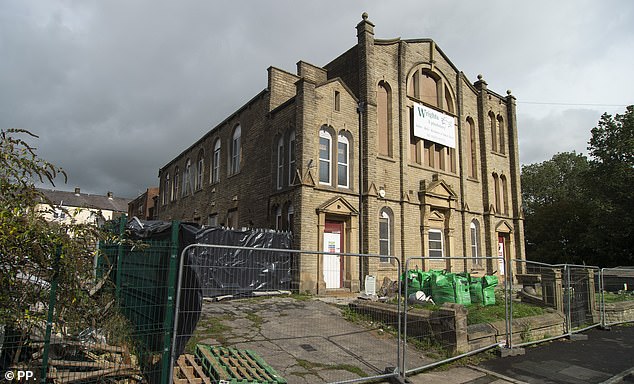
Police are investigating a suspected arson attack on a Victorian Methodist church (above) which had been the home – until 2021 – of Wright’s Upholstery
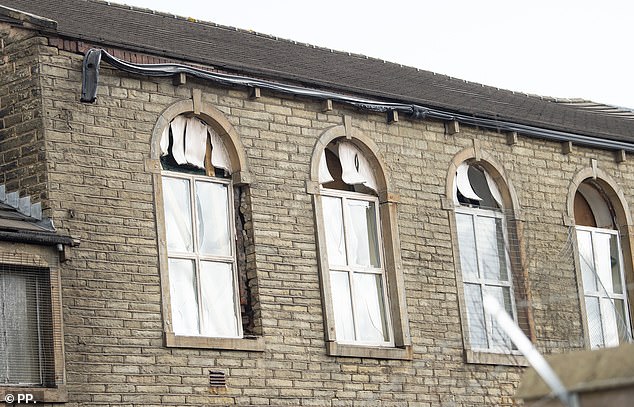
A fire broke out on August 19 at the rear of the property (damage seen above), with the blame pointed at angry locals who fear the building is being converted into an HMO
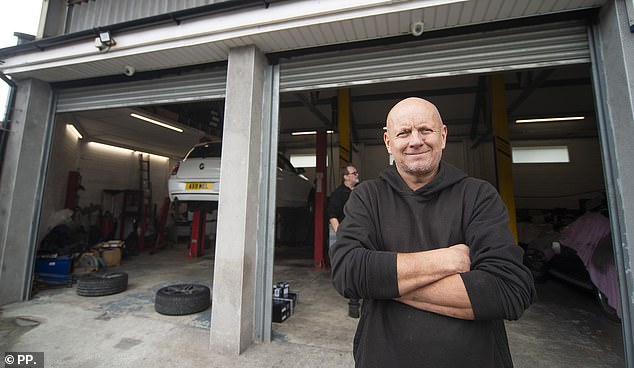
Local mechanic Nicholas Porter, 51, said he doesn’t think ‘many people believe the council’ after they said the intent was to convert the building into student housing, not HMOs
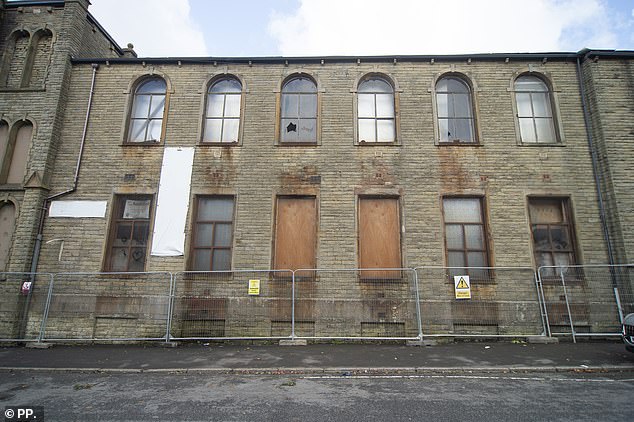
Lancashire Police said they were investigating the damage to the property (above) which has been left charred and with its windows boarded up
Yet a part-time tree surgeon who only gave his name as Imra, said he is finding it tough to make ends meet.
Imra, originally from Hungary, has a wife and baby and said: ‘These people have so many benefits – more than most. I work my arse off and we’re struggling like crazy. It makes it more difficult for people like us.
‘The fact that asylum seekers are being housed locally is affecting rents. There was already a lack of affordable housing anyway but recently our rent went from £480-a-month to nearly £700-a-month.’
Some five-and-a-half miles west of Burnley, in the borough of Hyndburn – population 84,747 – the situation is the same.
Two terraced houses next to each other in a quiet street in Oswaldtwistle, near Accrington, are filled with eight asylum seekers. One of the properties was home to a pensioner who passed away in 2024 and was sold for £113,000.
Ethiopian Nahusenay Ayalew, 37, lives in the house next door with three other men from Eritrea and Afghanistan.
He arrived there in May, having been housed previously in a hotel in Birmingham and then the White House Hotel in Telford, Shropshire.
Nahusenay, from the city of Lalibela, crossed into neighbouring Sudan in 2023 to flee persecution from police in Ethiopia, where he said he was jailed for a year and a half without charge due to his father being a colonel in the previous deposed Government.
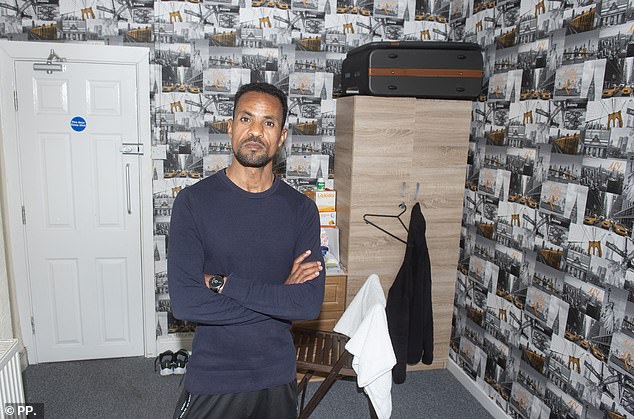
Ethiopian Nahusenay Ayalew (above) lives in a HMO in Oswaldthistle with three other men
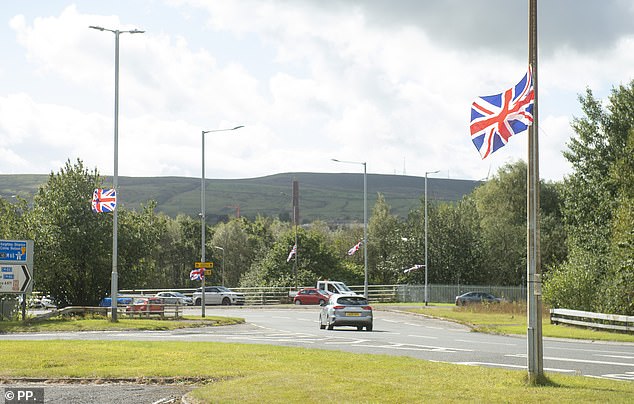
Union flags are spotted near a roundabout in Burnley amid Operation Raise the Colours
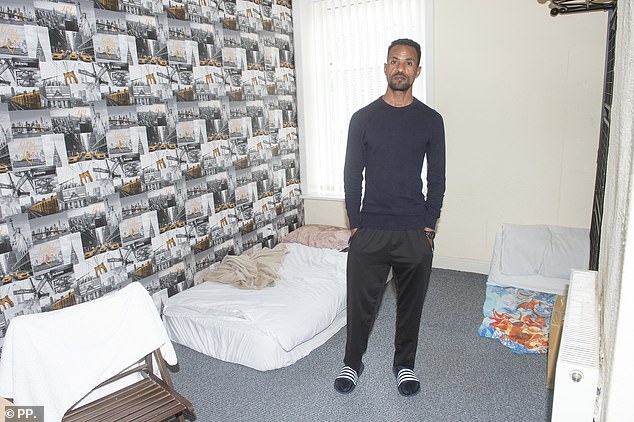
Nahusenay sleeps on a mattress on the floor in his HMO house after arriving in May this year
From Sudan he was smuggled into Libya on the back of a pick-up truck which crossed the Sahara Desert. His uncle paid for him to be put on a boat which sailed across the Mediterranean to Italy.
He then travelled on up through France before paying 900 Euros to be put on a boat crossing the Channel over to Kent and finally – via the West Midlands – on to Lancashire.
Nahusenay pointed to the corner of his bedroom where an iron bed frame has been stacked upright. He sleeps on just the mattress on the other side of the room and said: ‘my back was aching on that, I prefer to sleep on the floor lower down.’
He has a cupboard on which he has left his suitcase. Below it is a small chest of drawers with bottles of drinks and various items scattered on top. The wallpaper is filled with images of New York City.
Speaking downstairs in a dimly lit lounge, Nahusenay said he had tried numerous attempts to reach Britain before being finally successful.
He said: ‘I got on to a boat twice previously but I slipped off as it was moving and fell into the sea. I cannot swim but luckily someone had seen me getting into difficulty and pulled me to shore. When I did cross the sea to England it was on a boat with about 70 people on.
‘I didn’t really like living in the hotels, the White House in Telford was really busy, so full of people. One morning someone knocked on my door and told me I was going north to house-share.
‘I prefer living in a house than a hotel. I’d like to go to church more but there isn’t an Ethiopian Orthodox church in this area, the nearest is in Manchester but it’s difficult to get there because we get £49-a-week that we have to live on and that has to go on food really, not travel.’
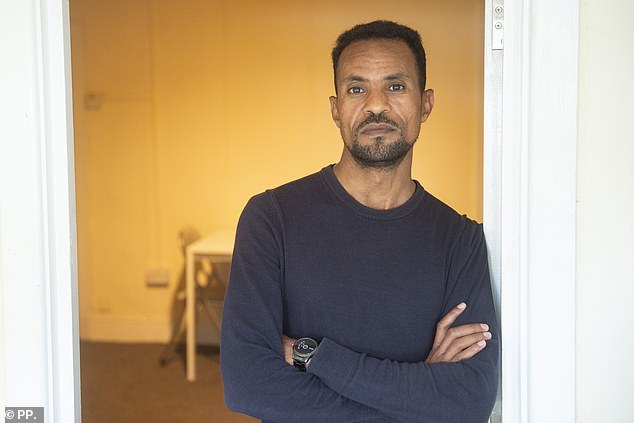
Nahusenay fled persecution from police in Ethiopia, where he said he was jailed for a year and a half without charge due to his father being a colonel in the previous deposed Government
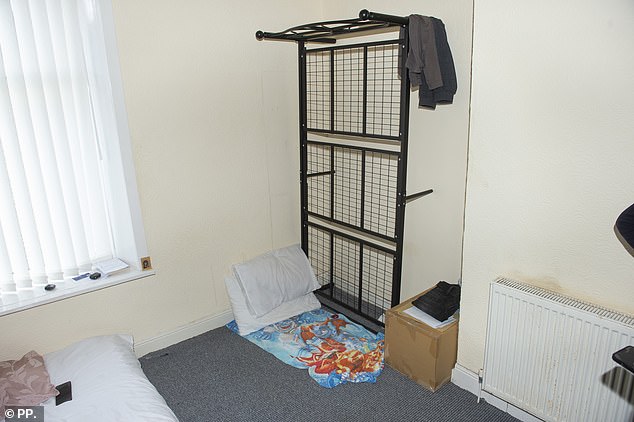
Nahusenay said his back was aching when he tried to sleep on the iron bed frame (above)
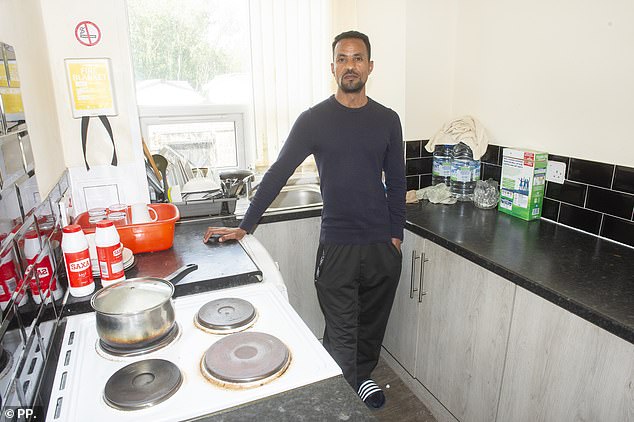
Nahusenay (above) said he had tried numerous attempts to reach Britain before being finally successful
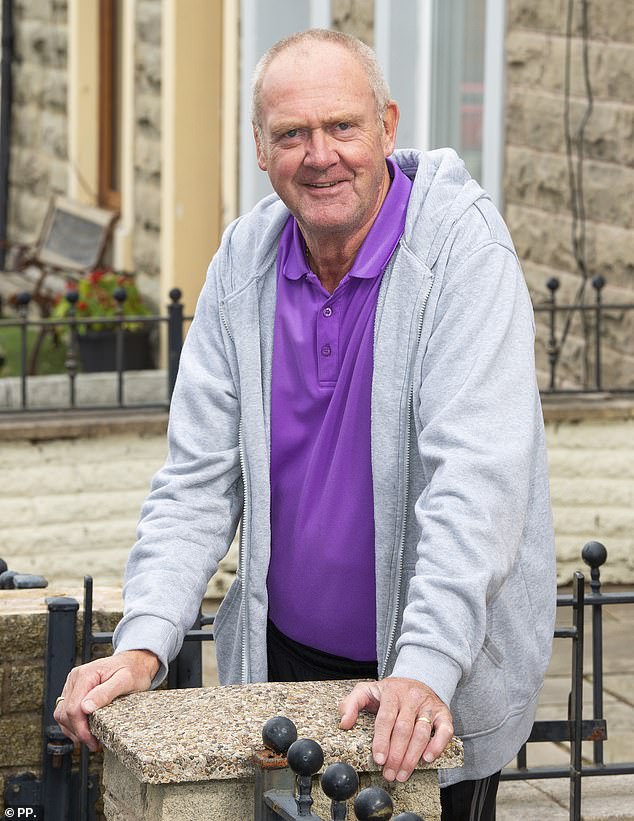
Tim Hargreaves lives near a HMO house and said ‘there’s a high turn-over of people’ in the street
Half-a-mile away is another terraced house in a well-kept street that has become home to asylum seekers.
Tim Hargreaves, 69, has lived nearby with wife Sandra, 68, for the last 34-years. He started work at Oswaldtwistle Mill as an 18-year-old, eventually becoming head of the preparation department before the mill closed.
He said: ‘There’s a high turn-over of people, one arrived last week. At the moment the residents in there are very quiet and keep to themselves. I really only see one lad walking past.
‘But the last lot in there were a problem. Some of them were asking kids playing in the street if they wanted to come into the house. We complained and they were taken out and replaced.
‘The street isn’t as close-knit as it once was. The issues with these HMOs is they stop families from moving in and laying down roots.’
Blackburn, another five and half miles west from Hyndburn, is the largest and most ethnically diverse of the three towns. It has a population of 159, 189 of which 60.4 per cent are white, 35.7 Asian, 0.9 per cent black and 1.4 per cent mixed race.
Last month Blackburn with Darwen Council was given more money by the Home Office to house asylums seekers after a surge in demand over the past year.
Grants have risen from £561,000 to £865,000 to cover the costs of support and housing provided by Serco.
The borough has been a designated dispersal area for 20-years meaning it has homed and supported people granted refugee status and those waiting for a decision on their asylum claim.











